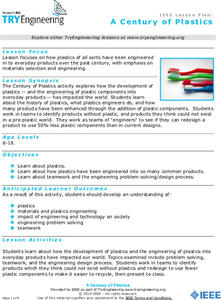Serendip
Carbohydrate Consumption, Athletic Performance and Health – Using Science Process Skills to Understand the Evidence
Should athletes carb load before an event or consume carbohydrates during the competition? Scholars discuss how to set up a hypothesis and experiment to answer a question relating carbohydrates and athletic performance. Then, they read...
Serendip
Should States Repeal Their Laws Banning First Cousin Marriage?
Around half of the states in the US ban first cousin marriage, but does science support that ban? Scholars work through genetic analysis of the risks to understand if more states should ban the practice—or if some should remove it. They...
Institute of Electrical and Electronics Engineers
A Century of Plastics
After reading about polymer materials, engineer trainees examine how plastics have been integrated into everyday products. In groups, they compile a list of products made entirely without plastics and then, as a closing activity, try to...
Curated OER
Science: Teddy Bear Nation
Students sort teddy bears according to types and then graph the results. They each bring a bear to class and then discuss their similarities and differences. Once the bears have been sorted into groups according to size and color,...
Curated OER
Science as a Catalyst for Life-Long Learning
Learners determine the minimal inhibitory concentration and the minimal fungicidal concentration of two types of drugs used to combat fungal infection. They use several different types of in vitro techniques which are performed in the...
Curated OER
Sounds like Science
Second graders create sound effects to produce a radio drama. For this sound lesson, 2nd graders read a book and provide the sound effects to transform it into a radio drama. They discuss sound and the shape of sound waves based on their...
Institute of Electrical and Electronics Engineers
Spring Scale Engineering
After examining how a spring scale works, teams work together to design their own general measurement device. Reading material provides background information, but there is no part of the procedure in which learners handle an actual...
Curated OER
Early Greek Science and Philosophy
There are fundamental principles that nearly everybody knows about. Define the principles of Golden Mean, Fibonacci Numbers, creativity, and matter in terms of their Greek origins. Presented here are brief histories, philosophies, and...
Curated OER
Aquatic Science
What a terrific way to explore the pond habitat! Learners discuss the animal and plant life found in the Long Island area. They also discuss vocabulary terms, identify pollution concerns, and resource conservation.
Institute of Electrical and Electronics Engineers
Fun with Speedboats!
After reading about marine engineers and naval architects, it's all hands on deck to design and test a speed boat. This lesson is designed for the Next Generation Science Standards in engineering and can be a centerpiece for a STEM...
Ed Galaxy
What is a Scientist? Classroom Poster
Awaken the young scientist in your students with this classroom display. Complete with a variety of science-related verbs, this poster will help guide learners as they explore the world around them.
Carnegie Mellon University
Home Energy Audit
Youngsters make a mental assessment of electricity-consuming appliances in their homes and then evaluate them for the amount of energy consumed. They learn how to use power meters and measure the electrical consumption of several...
Environmental Education in Wisconsin
Biome Travel Guide
In a perfect marriage of social studies and science, groups work together to research and create a travel guide presentation to share with the class. Not only do kids learn about the climate and geography of a biome, but also the...
Community Consolidated Schools District 168
Solar System Model Project
Challenge young astronomers to demonstrate their knowledge of the solar system with this fun open-ended science project. Provided with a short list of requirements, students are given the freedom to use their creativity and whatever...
Signing Time Foundation
What is the Water Cycle?
Dive into an exploration of the water cycle cycle with this simple earth science lesson plan. After first discussing where rain comes from, young scientists define the terms condensation, evaporation, transpiration, and precipitation as...
National Wildlife Federation
The Water Cycle
Observe the water cycle from the comfort of your classroom with this excellent earth science experiment. Working collaboratively, young scientists first create terrariums complete with hills, plants, lakes, and an atmosphere,...
Brooklyn Children’s Museum
Volcanoes!
Give young geologists an up close and personal look at volcanoes with a series of hands-on earth science lessons. Whether they are investigating the properties of igneous rocks, building their own volcanoes, or making fudge to model the...
Sunburst Visual Media
Clouds
Support science instruction with a combination of engaging activities and skills-based worksheets that focus on clouds. Learners take part in grand discussions, write an acrostic poem, complete graphic organizers, solve word puzzles, and...
National Energy Education Development Project
The Science of Energy
Did you know the word energy comes from energeia, a Greek word? Introduce learners to the four types of potential energy, five types of kinetic energy, and energy transformation with a presentation about where we get our energy and how...
Institute of Electrical and Electronics Engineers
Build Your Own Robot Arm
Engineers team up to design and construct an 18-inch-long robotic arm that can successfully pick up a paper cup. Each group is given the exact same set of materials, but it is up to them to decide what to use and how to use it. It is a...
Curated OER
#16 Separation Science Lab
Students in this inquiry-based experiment, put in the role of a method development chemist. The scenario they are given is that a train wreck has occurred resulting in a chemical spill. Students are told that the spill mixture consists...
Curated OER
Ice Cream: a Taste of Science!!
High schoolers define the term solution. They explain conservation of energy and energy transfer as it relate to how the milk solution became ice cream. Students are able to explain freezing point depression.
Curated OER
Science: Schoolyard Trees
Sixth graders choose specific trees to research while taking a nature walk around the schoolyard. They discuss tree and leaf parts and observe various types of leaves. After writing their reports, 6th graders present them to the class...
The Science Spot
Independent Investigation Guidelines
A neatly formatted outline of the steps of the scientific method can be used as a reference sheet for your future science fair participants. For each step, you will find a few guiding questions or points to remember when working on them.
Other popular searches
- Earth Science
- Physical Science
- Life Science
- Science Project
- Science Space
- Environment Science
- History of Science
- Environmental Science
- Pe Science
- Family and Consumer Science
- Consumer Science
- Social Science
























